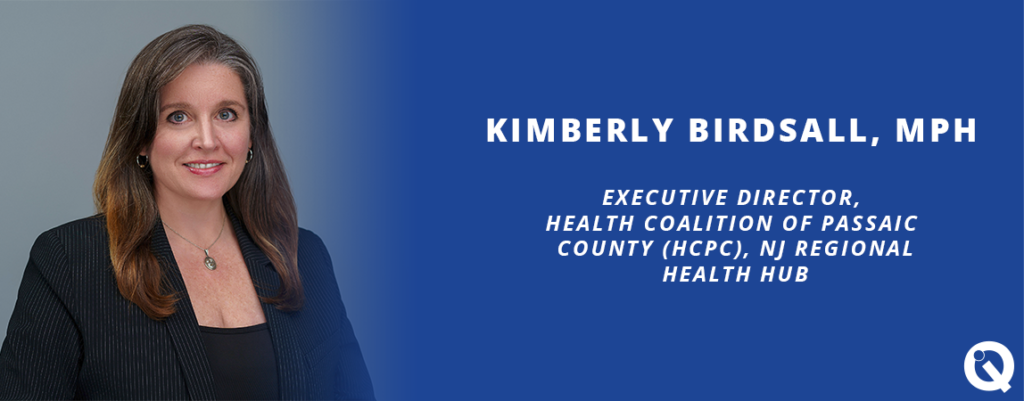Kimberly Birdsall, MPH, is Executive Director of the Health Coalition of Passaic County (HPCP), one of four Regional Health Hubs in New Jersey. The organization is a Quality Institute ACO Council member.
Tell us what your organization accomplishes as a Regional Health Hub (RHH)?
We’re dedicated to improving health outcomes and reducing regional health disparities by working in partnerships to address social determinants of health. We continue to play a key role in COVID-19 response and recovery. Through our Community Action Board, we established a COVID-19 task force team to implement a COVID-19 vaccination and information communication strategy at the local level.
In addition, we continue outreach and client support through care coordination, food delivery, resource navigation, and connecting clients to community services and programs. We’re a partner with the New Jersey Department of Health to address racial health disparities, maternal and infant morbidity and mortality, and assisting in COVID-19 response and recovery.
The Health Coalition of Passaic County was not part of the original Medicaid Accountable Care Organization (ACO) Demonstration Project. How did the organization become a Regional Health Hub?
We were founded by a grant from The Nicholson Foundation in 2016 and our goals, work and objectives mirrored those of the three state-funded Medicaid ACOs. We were embraced by those organizations, and we worked with them to share knowledge, insights, and initial funding.
In January 2020, the Regional Health Hub (RHH) law took effect in New Jersey, building on lessons from the legislatively created Medicaid Accountable Care Organization Demonstration Project and including the HCPC as the fourth organization. Including us showed that this work could be expanded, that the Medicaid demonstration project had incredible value, and that the work of regional health hubs could be replicated. We had tremendous leadership from our board and partners, such as St. Joseph’s Health and St. Mary’s, and non-clinical partners such as the Passaic County Department of Health and the Paterson Housing Authority.
How has your organization worked to support the state’s efforts to combat COVID-19?
We worked with our anchor institutions and clinical partners, community-based organizations, and the State to advance vaccination rates, address vaccine hesitancy, and really bolster trust. We organized community discussions and people had the opportunity to be heard. We connected people with our clinical partners to answer their questions.
An example is our regular meetings with community-based and faith-based partners, where we are sharing COVID-related information and information on areas such as the importance of cancer screening. We had an ambassador program to improve health literacy. From the beginning, our communities have had impressive vaccination rates.
What’s on the horizon for your organization over the next three-to-five years?
HCPC is working to become a certified Pathways Community Hub organization, and we will continue to advance the work and priorities of the Office of Medicaid. The vision of our board is to ensure that we are a go-to, trusted source for data, grant collaboration and strategic partnership for our region. We want to ensure that we are a sustainable organization with proven results from actionable data that advance health equity.
We’ll continue using UniteUs (previously NowPow) to measure, track, identify, and connect folks to resources. We’ve done work with community asset mapping — figuring out what exists in our community and getting people connected to vetted resources and coordinating their care.
We will continue connecting people in need of financial stability, housing assistance, or food. A significant need that we’ve seen is housing and behavioral health, and we’ve identified challenges in being able to close those needs in a sustainable way. Right now, we are digging deeper on how we can work to address those needs. Are there policy barriers? Or is it just supply and demand?
We like to ask the people we interview something beyond their professional life. So where might we find you on a day away from work?
I am unfortunately a self-proclaimed “workaholic.” When I am not working, I am thinking about how we can more effectively work together to fix these issues and achieve lasting positive change in our communities.
When I do disconnect, my favorite thing is spending time with my husband and our three children. It really doesn’t matter what we are doing: talking, taking a trip to the beach, traveling — or doing nothing at all. Our children are now young adults, and it is such a different dynamic as a parent to see them discovering who they are and their missions in life.

